
Life is measured by time. A human life has duration. The gravestones of the dead record the age of the deceased. Human language speaks of past time, present time, and future time. Any life may be lived more or less energetically, and more or less happily or contentedly, but every life is lived at exactly the same rate.
We measure time by the passage of the seasons, by the fullness of the moon, by the alternation of day and night, and by clocks in which pendulums swing or crystals oscillate.
All life, humanity included, is always to some degree busy maintaining itself. Life does not consist of leisure. There is always, to a greater or lesser degree, a shortage of free time and an abundance of work.
At work, people concentrate on some task, to the exclusion of all else, doing what they must do rather than doing what they want to do. It is only in idle time that anyone can do what they want to do. Therefore to the extent anyone wants to do something, they simultaneously wish for the idle time in which to do it. Busy at work, humanity is constrained. Idle at play, humanity is free.
The primary goal of humanity is to escape from the constraint of toil, and to discover the freedom of idleness: to move from a busy condition to an idle condition.
This goal is not only a matter of what people wish, but also a matter of necessity. The carrot is the prospect of freedom as idleness increases. The stick is the prospect of toil and ultimately death as idleness decreases.
Therefore actions must principally be judged according to whether they bring gains or losses of idle time. Ethics is not principally about what people should do in their idle time: it is about what people should do to come by idle time.
Any action entails gains or losses of idle time. For example, acquiring some useful tool which will speed up some necessary chore will result in a gain of idle time. Equally, losing such a tool will entail a loss of idle time. And searching for a lost tool entails an expenditure of idle time. But finding it again is to recover the lost time.
And because time has no other quality than duration, and this duration is measured in numbers of minutes and seconds, years and days, it follows that it is open to mathematical treatment. If the outcomes of actions are all measured in terms of gains and losses of idle time, then any action can be described in mathematical terms, and its gains and losses calculated.
Discounting psychological states
Accompanying these actions and their outcomes, there may be a variety of psychological states. Someone may be pleased to acquire some useful tool, and angry at losing it, anxious while searching for it, and relieved upon finding it. But these psychological states are largely consequences of foreseeing likely outcomes. The new owner of a useful tool is pleased because he foresees the idle time it will bring him, angry at losing it when he foresees the increase of work attendant upon the loss. Such states of mind might themselves be described as the result of a series of mental calculations which run in parallel with physical action, with pleasure being the consequence of estimating a gain, and displeasure the consequence of estimating a loss, and their intensity dependent upon the scale and certainty of the gain or loss. For while performing any activity, anyone also models in their own mind what they do, as some plan which is constantly being adapted as circumstances change. The outcomes of these mental models form no part of the real outcome: all that matters is what actually results, not what is expected to result, or what is hoped to result, or what is feared to result.
Another way of putting this might be to say that individual human opinions or judgments about any set of circumstances are themselves evaluative in nature, and such evaluations should not be included in a separate evaluative process, but instead set beside it. One should not evaluate evaluations. For example, a detective investigating a crime should seek all the relevant facts relating to it, but should disregard all opinions proffered about the likely culprit. He should take account of the fact that Mrs Scarlett saw a bloody candlestick in the lounge, but discount her opinion that Colonel Mustard was the murderer. So equally when morally evaluating some action, it is the facts of the matter that should be considered, and any opinions about its merit or demerits discounted.
This is not to say that opinion is always to be discounted. There is obviously a debate to be had about how different people arrive at different judgements, and one that is about comparing and evaluating different evaluative procedures. But that is a higher order evaluative process - like choosing between Christianity and Buddhism and Utilitarianism. Idle Theory's evaluative process is, in outline, a matter of totalling up the time gains and losses consequent to some action. Whether that evaluative process is a good or useful or comprehensive process is an entirely separate matter of discussion.
Egoism: the ethics of individual life
Atomic individuals, existing outside any society, are necessarily solely concerned with their own personal idle time gains and losses. Theirs is an ethical egoism.
Acts to which a purely egoistic ethics apply may also apply to what an individual does in private, alone, unseen, and unheard. In such privacy, it may be argued that their actions have no direct effect upon any other persons (although there may be counter-arguments). In privacy, individuals have no need to concern themselves with the effects of their activities upon other people.
Acting solely on his own behalf, an individual, A, will generally act to increase his own idleness, choosing to do whatever is easiest for him, avoiding what is hardest. He will carry out actions which win him idle time, and avoid actions which cost him idle time. Or he will prefer outcomes which increase his idle time, and dislike outcomes which decrease his idle time.
 The effect of any action of an individual can be described as a point on an axis, with idle time gains on the positive side of the origin, and idle time losses on the negative side.
The effect of any action of an individual can be described as a point on an axis, with idle time gains on the positive side of the origin, and idle time losses on the negative side.
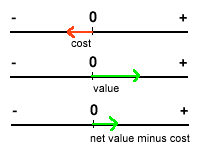 Thus, for example, the time cost of making some tool would register as a point on the negative side. And the value of the tool, the time it saved him while using it performing some task, would register on positive side. The net value of the tool would then be the value minus the cost. If the value of the tool was greater than its cost, the net value of making and using this tool would register as value minus cost, as some positive value.
Thus, for example, the time cost of making some tool would register as a point on the negative side. And the value of the tool, the time it saved him while using it performing some task, would register on positive side. The net value of the tool would then be the value minus the cost. If the value of the tool was greater than its cost, the net value of making and using this tool would register as value minus cost, as some positive value.
The most anyone can lose is their life. The measure of that is not simply their remaining natural lifetime, but their remaining expected idle time. If a natural lifetime is 70 years, an individual of 30 years of age has an expectation of a further 40 years of life. And if that life is 50% idle, then the lost idle time is 20 years.

|
In this approach, the death of newborn child is a greater loss than that of an elderly man or woman. But also the death of an idle individual entails a greater loss than that of a busy individual.
Equally, if someone is on the brink of an early death, by disease or accident, then if that life is saved, what is gained is the remaining idle lifetime.

|
In this approach, there is no absolute value of human life, but a scale of values. But it is problematic to the extent that what is an expected lifetime has the nature of a guess, as is expected future idleness. It might be argued that, given such ignorance, we should expect the longest imaginable lifetime, and the highest idleness, and in so doing render every death equivalent to every other.
Ethics in society
In co-operative human societies, individuals are dependent on other individuals for goods or services. The farmer, the butcher, the baker, the blacksmith, the lawyer, the roadsweeper, and all the other trades of society are mutually dependent on each other. Therefore it is in the interests of any individual to take account of the effects of his actions upon other members of society. What harms one also harms others: if the baker is hurt, the society he serves gets no bread. Therefore members of society should be considerate not only of their own interests, but the interests of others.
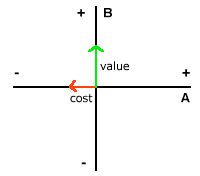 When a second individual, B, is introduced, such that the actions of A have positive or negative effects on B, and vice versa, then the axis on which B's gains and losses are plotted may be drawn orthogonally, or at a right angle, to the axis of A. So that if A makes some tool, and gives it to B to use, then this exchange involves a loss to A of the time cost of making the tool and a gain to B of the time value of the tool - the time the tool will save in performing some task.
When a second individual, B, is introduced, such that the actions of A have positive or negative effects on B, and vice versa, then the axis on which B's gains and losses are plotted may be drawn orthogonally, or at a right angle, to the axis of A. So that if A makes some tool, and gives it to B to use, then this exchange involves a loss to A of the time cost of making the tool and a gain to B of the time value of the tool - the time the tool will save in performing some task.
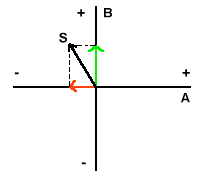 In this case the net effect on both A and B can be described as a resultant at the point, S, between these two axes which forms the fourth point on a rectangle. This point describes, by dropping perpendiculars to each axis, both the gains or losses to both A and B.
In this case the net effect on both A and B can be described as a resultant at the point, S, between these two axes which forms the fourth point on a rectangle. This point describes, by dropping perpendiculars to each axis, both the gains or losses to both A and B.
Given that there may be any number of interactions between A and B, such that in some cases one wins 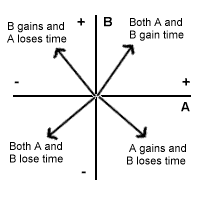 and the other loses, or both win, or both lose, to some greater or lesser degree, there can be imagined to be any number of these resultants, corresponding to different kinds of interaction.
And while both A and B are primarily concerned with their own wellbeing, the resultant of their interactions may be used to describe the net effect on the association, or society, of A and B. And the most positive effects upon their society are to be found in the top right quadrant, and the most negative effects in the bottom left quadrant, with mixed results in the other two quadrants. In these two quadrants, where one wins and the other loses, the net effect on their society is one of little overall change.
and the other loses, or both win, or both lose, to some greater or lesser degree, there can be imagined to be any number of these resultants, corresponding to different kinds of interaction.
And while both A and B are primarily concerned with their own wellbeing, the resultant of their interactions may be used to describe the net effect on the association, or society, of A and B. And the most positive effects upon their society are to be found in the top right quadrant, and the most negative effects in the bottom left quadrant, with mixed results in the other two quadrants. In these two quadrants, where one wins and the other loses, the net effect on their society is one of little overall change.
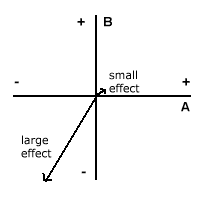 Any action may also have either large effects or small effects on the individuals concerned. The cost of A holding open a door to let B pass through represents a loss of time of a few seconds to A, and perhaps a gain of time of a few seconds to B. Such gains and losses are individually unimportant, but if they frequently happen, they may add up to significant amounts of time. Conversely, it may be argued that an action by A that results in the death of B is one which costs B the remainder of his expected lifetime. Or if some action by A results in the permanent disablement of B, such that life becomes more difficult for B, and consequently less idle, then that decrease in idleness over the duration of his life is the loss to B.
Any action may also have either large effects or small effects on the individuals concerned. The cost of A holding open a door to let B pass through represents a loss of time of a few seconds to A, and perhaps a gain of time of a few seconds to B. Such gains and losses are individually unimportant, but if they frequently happen, they may add up to significant amounts of time. Conversely, it may be argued that an action by A that results in the death of B is one which costs B the remainder of his expected lifetime. Or if some action by A results in the permanent disablement of B, such that life becomes more difficult for B, and consequently less idle, then that decrease in idleness over the duration of his life is the loss to B.
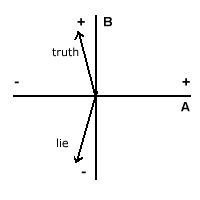 The effect of telling the truth as against telling lies might be illustrated. B is searching for something, and A knows where it is. If, when asked, A tells B the truth, this will save B some amount of time. But equally, if A tells B something other than the truth, this will cost B an unnecessary extra amount of time searching. The virtue of truthfulness is that it saves time. The rule isn't absolute: If B is searching for a gun to shoot someone, it may save someone's life to not tell the truth where the gun is.
The effect of telling the truth as against telling lies might be illustrated. B is searching for something, and A knows where it is. If, when asked, A tells B the truth, this will save B some amount of time. But equally, if A tells B something other than the truth, this will cost B an unnecessary extra amount of time searching. The virtue of truthfulness is that it saves time. The rule isn't absolute: If B is searching for a gun to shoot someone, it may save someone's life to not tell the truth where the gun is.
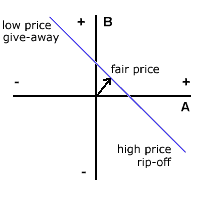 If A makes some tool in time C, whose value to B is that it saves him some amount of time V in some activity, if A simply gives B the tool, then it costs A time C, and wins A time V. Selling the tool at some price is a way of arranging for both to gain from the transaction, rather than one gain and the other lose. Given prices that represent amounts of time, a low price - a 'give-away' - corresponds to giving the tool away, and a very high price - a 'rip-off' price - is one which is higher than the value of the tool. In between there are a range of prices in which both buyer and seller gain.
If A makes some tool in time C, whose value to B is that it saves him some amount of time V in some activity, if A simply gives B the tool, then it costs A time C, and wins A time V. Selling the tool at some price is a way of arranging for both to gain from the transaction, rather than one gain and the other lose. Given prices that represent amounts of time, a low price - a 'give-away' - corresponds to giving the tool away, and a very high price - a 'rip-off' price - is one which is higher than the value of the tool. In between there are a range of prices in which both buyer and seller gain.
There are also circumstances in which nobody gains any time, and some may lose time. About their everyday business, people sometimes obstruct each other. Cars get stuck in traffic jams. Vehicles impede each others paths. People try to go through the same door in opposite directions. If nobody gives way, it only wastes everyone's time. In these circumstances it is usual for one person to give way and let the other pass. Courtesy, or good manners, requires that the loss be minimized, and that who gives way on one occasion is given way on another. In such manner the loss of time from obstruction is minimized and equally distributed.
But while there might be a net gain or a net loss to society, there is also a degree of inequality of the distribution of gains and losses. If old Mrs F had such difficulty breathing that she died, then while A's fire might prove a net gain to society, it would cause the most tremendous loss to Mrs F. And this also needs to be taken into account.
This creates, in effect, a new set of axes of social gain and loss, in which the axis that runs diagonally from bottom left to top right represents the degree of social gain or loss, and runs from the maximum social loss, through a zero at the origin, to the maximum social gain. And the axis that runs from top left to bottom right represents the degree of inequality or inequity of outcome, with zero inequity at the origin.
Social moral codes should therefore reflect the consequences of actions, with acts injurious to social idleness prohibited, and acts beneficial to social idleness rewarded.
Some actions may appear ambiguous. It might be argued that an act of theft by individual A from individual B is equivalent in its effects as that of a gift of the same thing by B to A.
Beyond human society
The argument of social ethics is essentially that in co-operative human societies people are dependent upon each other, and is from this dependency that there grows mutual concern. But this dependency extends beyond human society.
Any particular co-operative human society is one of many such societies, which are to a greater or lesser degree bound together in trade. One society is very often dependent upon another for materials or tools or skills or labour. And it is through this mutual dependency of trade that there arises the same set of relations between societies as exists within co-operative human societies. The trade between societies is essentially not different from the trade within societies.
In this respect, it follows that wars between societies are as destructive - and as intolerable - as murder, theft, vandalism, and rape within co-operative civil society.
Beyond human society, however, there extends the entire natural world of plants and animals, of earth and rivers and rainfall and sunshine, upon which human life depends. And this dependency upon the natural world means that humanity owes the same care to the natural world as they owe to each other.
Therefore a farmer is not a mere plunderer of the bounty of the natural world, but one who acts to increase its bounty, by protecting plants from grazing animals, ensuring they are watered, and ploughing and fertilising the earth in which they grow. The farmer acts to make life easy for his plants, allowing them to grow tall, and yield rich harvests.
And in the same way as he protects plants, so also he protects animals - cattle, sheep, pigs - from predatory wolves and lions, and ensures that they are watered and fed, treating their infirmities, even sheltering them from the worst of the elements. In this way a farmer increases the idleness his herds, ensuring that they grow fat and healthy.
Of course, these plants and animals almost all pay for this idle existence with their lives, to be eaten by humans, their skins tanned into leather, their stems wound into ropes and baskets. But human lives also end, and just as men consume plants and animals, in death their bodies are consumed by animals, or their ashes fertilise the earth in which crops grow. If humanity consumes plants and animals, plants and animals also consume humanity. Only the occasional pharaoh, mummified in a rock tomb, escapes this mutual trade.
And human care extends also to rivers and lakes and ponds, because these supply them with fresh water, and carry their boats.
Human society does not consist of humans, but also of the wider family of all the plants and animals that humanity has use of, as food and herbs and spices and medicines and preservatives, as timber and leather and grease and honey and wax and paper.
In many profound senses, the relation of all life upon this globe is one of mutual dependency. The natural world is in itself an economic system in which all creatures seek to lead idle lives. The inventiveness of men is surpassed by the invention of the natural world.
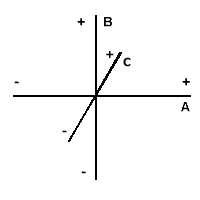 When a third person C is added, their axis of time gains and losses is orthogonal to the A and B axes, and would be represented by a line coming out of this two dimensional page. And when a fourth person is added, their axis is again orthogonal to the other 3 axes, and so on to the Nth dimension. (This kind of multidimensional space is known as hyperspace.) Thus the effect of some action could be described in terms of the time gains and losses to each member of a society. For the most part, activities carried out in privacy alone affect only the agent. And many other activities may affect two other people. But some acts may have a ripple of effects through a society. Thus if A starts a fire in his back yard, and thick smoke drifts across the community, such that B can't see what he's doing and has to stop work, and C's clothes hanging out to dry are covered in soot, and D and E are forced to make detours on the roads, and old Mrs F is taken ill with breathing difficulties, and so on, the losses to B, C, D, E, and F can be set against the gain to A. Here the net social gain is the sum of all the individual gains and losses. Thus if A lit the fire to dispose of unwanted rubbish, the effect of his action would likely be a net loss to society. But if A lit the fire in a kiln in which he was firing clay pots of high net value to the community, then the result might be a net gain to society.
When a third person C is added, their axis of time gains and losses is orthogonal to the A and B axes, and would be represented by a line coming out of this two dimensional page. And when a fourth person is added, their axis is again orthogonal to the other 3 axes, and so on to the Nth dimension. (This kind of multidimensional space is known as hyperspace.) Thus the effect of some action could be described in terms of the time gains and losses to each member of a society. For the most part, activities carried out in privacy alone affect only the agent. And many other activities may affect two other people. But some acts may have a ripple of effects through a society. Thus if A starts a fire in his back yard, and thick smoke drifts across the community, such that B can't see what he's doing and has to stop work, and C's clothes hanging out to dry are covered in soot, and D and E are forced to make detours on the roads, and old Mrs F is taken ill with breathing difficulties, and so on, the losses to B, C, D, E, and F can be set against the gain to A. Here the net social gain is the sum of all the individual gains and losses. Thus if A lit the fire to dispose of unwanted rubbish, the effect of his action would likely be a net loss to society. But if A lit the fire in a kiln in which he was firing clay pots of high net value to the community, then the result might be a net gain to society.
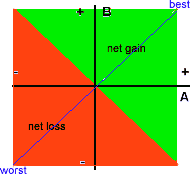 These social gains and losses, returning to the 2-person case, might be expressed by colouring every point that represents a net social loss in red, and every point that represents a net social gain in green.
These social gains and losses, returning to the 2-person case, might be expressed by colouring every point that represents a net social loss in red, and every point that represents a net social gain in green.
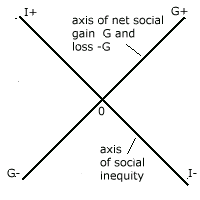 The G-axis, the axis of social gain and loss, measures the total net time gain or loss resulting from some act, and is found by simply adding each person's gain or loss to find the total. The I-axis, the axis of social inequity, would measure the subtracted gains and losses. Thus if Ga represents the gain or loss by A, and Gb represents the gain or loss by B, then then net gain G = Ga + Gb, and the inequity I would be Ga - Gb. Thus where Ga = Gb, inequity I would equal zero.
The G-axis, the axis of social gain and loss, measures the total net time gain or loss resulting from some act, and is found by simply adding each person's gain or loss to find the total. The I-axis, the axis of social inequity, would measure the subtracted gains and losses. Thus if Ga represents the gain or loss by A, and Gb represents the gain or loss by B, then then net gain G = Ga + Gb, and the inequity I would be Ga - Gb. Thus where Ga = Gb, inequity I would equal zero.
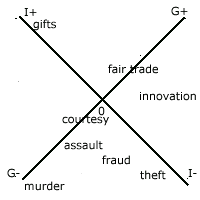 In this manner, the consequences of any action can be assessed, and the overall social idle time gains or losses estimated. In general, any society will prefer actions which increase social idle time above actions which reduce social idle time. And it will prefer actions in which the results are equitably divided to those whose gains and losses are inequitably divided.
In this manner, the consequences of any action can be assessed, and the overall social idle time gains or losses estimated. In general, any society will prefer actions which increase social idle time above actions which reduce social idle time. And it will prefer actions in which the results are equitably divided to those whose gains and losses are inequitably divided.
